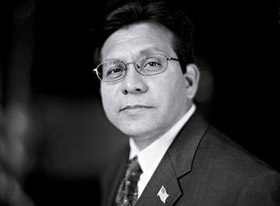 |
 |
 |
 News from Around the Americas | August 2005 News from Around the Americas | August 2005  
The 25 Most Influential Hispanics in America
 Viveca Novak - Time Viveca Novak - Time


| | From music to politics to business, Hispanics are remaking America. Here's a list of the 25 titans leading the Latino charge into the 21st century. |
Spanish has become the U.S.'s de facto second language, Nuevo Latino has taken its rightful place in haute cuisine, the sounds of rock en Espaρol and reggaeton have filtered up the charts, and Latinos not only star on but own and manage major league baseball teams. But like any immigrant group that has shaped mainstream U.S. culture before fully asserting its economic or political power, the nation's 41.3 million Hispanics are just getting warmed up.

While they command nearly $600 billion in buying power, they are only starting to attract the marketing attention on Madison Avenue that they merit, and their political clout similarly lags behind their sheer numbers. The country's largest ethnic minority, Hispanics promise to help remake America in the 21st century as vitally as African Americans did in the 20th.

Still, perhaps more than any of their immigrant predecessors, Hispanics defy easy categorization. Mexican Americans, Cuban Americans and Argentine Americans may all speak the same language, but many wouldn't dream of standing under the same cultural umbrella. A fair number of U.S.-born Hispanics don't speak Spanish, and many others have little or no European blood.

Indeed, the category Hispanic is a gringo constructfirst used by the U.S. Census Bureau in 1980and the only one based on culture and language instead of race. That dubious distinction frustrates some Hispanics, who believe they belong to a separate race, the product of an epic Latin American miscegenation of Iberian, Native American and African heritage.

A growing number, especially in California and the Northeast, prefer the term Latino. But in a Time poll of Hispanic adults, 42% said they choose to be called Hispanic, only 17% said Latino and 34% had no particular preference.

Such a wide array of opinions and agendas is reflected in Time's list of the nation's 25 most influential Hispanics, who range from celebrities like J. Lo and Los Angeles Mayor Antonio Villaraigosa to the lesser-known labor activist Pablo Alvarado and art curator Mari Carmen Ram'rez. She says her job is to be an evangelist for Latino culture. With these 24 powerful Hispanics at her side, no wonder word is spreading fast.

Alberto Gonzales
Mel Martinez
Lionel Sosa
Antonio Gonzalez
Antonio Villaraigosa
Cristina Saralegui
Gustavo Santaolalla
Robert Rodriguez
Alisa Valdes-Rodriguez
Anthony Romero
Arturo Moreno
George Lopez
Jennifer Lopez
Jorge Perez
Mari Carmen Ramirez
Narciso Rodriguez
Aida Giachello
Bill Richardson
Jorge Ramos
Pablo Alvarado
Mario Molina
Jose Gomez
Salma Hayek
Sara Martinez Tucker
Ysrael Seinuk
Alberto Gonzales - The President's Counselor

On the surface, they seem an odd couple. one, the son of migrant workers, grew up in a house without hot water or a telephone. The other is the scion of a rich and powerful political dynasty. But Alberto Gonzales and George W. Bush have joined in a largely successful effort to build a more muscular executive branch. Drawn to the quiet lawyer's up-by-his-bootstraps story, then-Governor Bush persuaded Gonzales to leave his lucrative law practice in Houston and become his general counsel in 1994. Bush later put Gonzales on the Texas Supreme Court, and when Bush moved north, he made Gonzales White House counsel and, earlier this year, the nation's first Hispanic Attorney General.

It was at the White House that Gonzales became a chief architect of Bush's push to increase the White House's clout. Before 9/11, he advised the Administration on resisting disclosures about its dealings with energy-industry execs. After the attacks, Gonzales helped write the Patriot Act, which expanded federal power in the name of fighting terrorism. He also oversaw the selection of Bush's very conservative judicial nominees and, perhaps most controversial, was centrally involved in the meetings and memos that set guidelines for the treatment of suspected terrorists picked up overseas. That record led to a closer-than-expected Senate confirmation vote of 60-36 for his current post.

Gonzales has brought a gentler tone to the Justice Department than that of his predecessor, John Ashcroft, but he hasn't much altered its course or his devotion to the goals that first brought him and Bush together. He remains close to the President, which could mean a Supreme Court nomination for Gonzales before Bush's term ends. | 
 | |
 |



